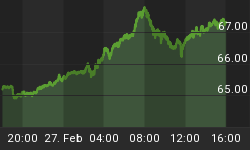This may come as news to some, but we're not operating in a global market - at least not anymore. That's what investors ought to be telling themselves if they expect to be profitable over the next 10-15 years.
Many investors today are sitting on portfolios with a substantial amount of foreign currency risk. Most are completely unaware of the fact, and even fewer understand it.
Over the past twenty-five years or so years the dollar has gone through a prolonged and substantial decline in value versus other global currencies. Today's dollar is worth only a fraction of its nearest peak under Reagan in the mid 1980s.
As this story has become popularized much of the investing public has piled into traditional dollar hedges including foreign stocks, oil, and gold, many of which have soared to all-time highs in recent years. [Note: Not that all investors have made money riding this wave; look no further than clients who got fleeced buying gold bullion through Goldline, the dealer touted by Glenn Beck and others. We tried to warn them, but no one wanted to listen.]
The problem is that, unbeknownst to many, the US dollar actually put in a significant bottom almost three years ago. This bottom is likely to be the end of a 20+ year bear market in the dollar, and the reversal of fortunes for many who have placed substantial bets against its value.
Here's the rub: The next ten years will almost surely NOT be a time to invest in foreign markets or otherwise bet against the US dollar. If the dollar continues to rally, which seems highly likely, any gains made from investing in foreign companies will be almost or entirely wiped out by fluctuations in the currency markets.
And that's not all.
The past couple decades have seen the emergence of so-called frontier markets, so-called because they are in countries that resemble emerging markets, but are thought to be even earlier in their "emergence" phase. Markets in off-the-radar countries like Bahrain, Bangladesh, Lithuania, Qatar, Sri Lanka, and Vietnam have seen tremendous surges in popularity as foreign investors have gone searching for the next BRIC nations.
What many will find is that these countries don't have markets, they have gambling pits. The people there are more than willing to welcome foreign investors and help them buy anything in sight; but once those foreigners (i.e.: Americans) try to cash-in there won't be a buyer in sight.
Remember that age-old lesson - we've written about it before - that an investment is only worth what someone is willing to pay for it? A lot of investors are going to learn this lesson the hard - and expense - way.
What is most frustrating about the state in which many investors find themselves is that it is at no fault of their own. The concepts discussed here are not simple or easy to understand; they are the kinds of things that investors pay advisors to help guide them through.
Unfortunately, many trusted advisors have done their clients a tremendous disservice by continuing to push clients into anti-dollar positions over the past few years. Advisors should be well aware of the downfall of the dollar since 1985, and have the foresight to understand that it will be turning up - and know how to help their clients take advantage.
Sadly, this is rarely how things work in the financial services industry. Very few advisors spend their time doing the research to understand these issues anymore than their clients. After all, it's infinitely easier to show a client a mountain chart of a foreign fund or gold over the past 15-20 years and convince them to buy; as opposed to push a downtrodden domestic fund that hasn't made a dime over the past decade.
Now we find ourselves having arrived at age-old lesson number 2, again one we have written about time and again: Investing with hindsight is never a good idea.
Investing with a perspective confined to history can be equated to driving but using only rearview mirrors to steer - it works just fine until the road curves. And that's exactly what has happened; the road has curved. Those investments that have done well over the past decade or two surely won't do as well in the next ten to twenty years. After all, economic conditions today are completely different. The conditions that resulted in gains for anti-dollar investments no longer exist - so why would the results be the same?















